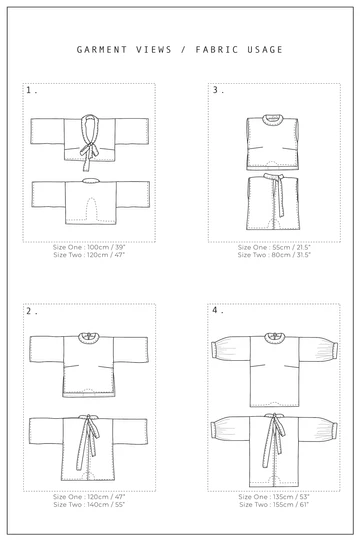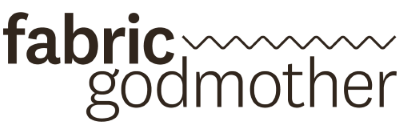Description
** PRINTED SEWING PATTERN: This is a PRINTED workbook which includes the sewing instructions, cutting instructions, and traceable templates. The folder is designed as a zero waste layout on A2 card and includes a handy storage folder to store templates and instruction booklets. Printed on FSC certified paper from responsible sources. The booklets are sewn together using 100% organic cotton thread. All printing and assembling is done in-house in Birgitta's studio in Malmö. **
This sewing pattern uses zero waste pattern cutting and is designed to fit on a particular size fabric. It comprises of instructions showing you how to draw shapes directly onto your fabric, leaving no waste. With the exception of some small templates to aide in the cutting process, no large paper pattern pieces are required. See the bottom of this description for more information about this method of garment making.
Sewing Level: Advanced Beginner
The Zero Waste (ZW) Tie Top is an oversized shape with a relaxed fit and comes with a high neck and low neck option as well as 3 different garment lengths. This top features an attached neck band which turns into a tie that can be positioned at the front or back neck, as well as additional instructions on how to add side splits and adding gathers and a cuff to the sleeves.
The finished width of this garment is determined by the fabric width you use. There are 2 size options for this top, a size ONE and TWO with a maximum hip size of 125cm / 53". The pattern also includes additional instructions to size up further to a 155cm / 61" hip.
Recommended Tools
Sewing machine, iron, chalk or dissolvable pen, scissors, large right angle ruler and/or long straight ruler.
Techniques used
Depending on the garment view you are working some of the techniques include button holes, gathers and splits.
Instruction Booklet: Includes measurements in both metric (centimetres) and US imperial (inches).
Size chart:
This is an oversized shape with 2 size ranges. The maximum bust/hip for each size depends on the fabric width you use. Suitable for up to a 125cm / 53" hip. There are also additional pattern layouts in the Instruction Booklet for making adjustment to the pattern to size up further to a 155cm / 61" hip.
Size One
Width 130cm / 51" = max bust/hip 89cm / 35"
Width 135cm / 53" = max bust/hip 94cm / 37"
Width 140cm / 55" = max bust/hip 99cm / 39"
Width 145cm / 57" = max bust/hip 104cm / 40"
Width 150cm / 59" = max bust/hip 109cm / 43"
Width 155cm / 61" = max bust/hip 114cm / 45"
Size Two
Width 130cm / 51" = max bust/hip 110cm / 43"
Width 135cm / 53" = max bust/hip 105cm / 45"
Width 140cm / 55" = max bust/hip 110cm / 47"
Width 145cm / 57" = max bust/hip 115cm / 49"
Width 150cm / 59" = max bust/hip 120cm / 51"
Width 155cm / 61" = max bust/hip 125cm / 53"
Fabric Type
The ZW Tie Top works great in a light - mid weight cotton or linen, as well as a mid weight silk or viscose. Both fabrics with some structure and fabrics with some drape work will work well.
Recommended Fabric Widths
130 - 155cm / 51 - 61"
Yardage required
These are a guide only. The yardage requirements are different for each garment view you are working with and may change depending on if you want to make any adjustments to the lengths of the sleeves and body. Refer to the Instruction Booklet for more.
SIZE ONE
View 1: 100cm / 39"
View 2: 120cm / 47"
View 3: 55cm / 21.5"
View 4: 135cm / 53"
SIZE TWO
View 1: 120cm / 47"
View 2: 140cm / 55"
View 3: 80cm / 31.5"
View 4: 155cm / 61"
Notions:
Garment view 3 requires x 2 buttons 18mm / 0.75" wide.

The method:
Zero waste pattern cutting is a bit like a puzzle. It is a method of pattern drafting where you utilise a length of fabric end to end by strategically planning your pattern pieces so that everything is used. This pattern does not require printing of large pattern pieces, instead you draw your pattern pieces directly onto your fabric with the aid of a cutting plan and templates. We love working with this method for 3 reasons:
1. More flexibility: This method allows for easy changes such as using different fabric widths and making simple fit and design changes yourself. Using patterns that fit into a zero waste square or rectangular block is a very efficient way to work. It means that it is easier to patchwork together remnants or use left over fabrics you already have lying around.
2. An easy way to learn to self draft your own patterns : Working this way will help you to start building a toolbox of skills, and you will learn an alternative method of self drafting your own sewing patterns, which are super easy for beginners to understand.
3. Less fabric and paper waste: Without having to print full scale paper patterns for all pieces you save on a lot of paper, and you will have little to no fabric waste during the cutting and sewing process!
























